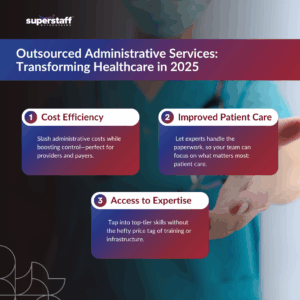
Healthcare costs continue to rise, creating financial pressure for both healthcare providers and payers. The challenge is not only in providing high-quality care but also in ensuring that care is cost-effective. With resources stretched thin, many healthcare organizations are turning to outsourced administrative services for healthcare providers as a solution. One of the key areas where outsourcing is making an impact is utilization management (UM).
Utilization management helps ensure that patients receive the right care while minimizing unnecessary treatments and tests. However, handling UM internally can be complex, requiring significant time, staff, and infrastructure. That’s why many healthcare organizations are exploring outsourcing options, especially when it comes to healthcare payer services outsourcing and healthcare quality assurance and outsourcing.
Why Healthcare Providers Are Outsourcing Utilization Management in 2025
As healthcare organizations face growing pressure to control costs, outsourcing utilization management is becoming an attractive option. The benefits are clear:

- Cost Efficiency: Outsourcing helps healthcare providers and payers save on the administrative costs associated with UM, making outsourced administrative services for healthcare providers an effective cost-control strategy.
- Improved Patient Care: With administrative tasks handled by external partners, healthcare teams can focus more on direct patient care.
- Access to Expertise: Outsourcing allows organizations to tap into specialized expertise without the need to invest in extensive training and infrastructure.
As we look to 2025, it’s clear that why healthcare providers are outsourcing utilization management in 2025 will become more prevalent, especially as the healthcare industry adapts to new challenges and trends.
The Role of Utilization Management in Healthcare Cost Containment
Effective utilization management is essential in controlling rising healthcare costs. UM helps ensure that resources are used efficiently, which can reduce unnecessary hospital admissions, tests, and procedures.
- Reduces Waste – By ensuring that treatments are necessary and in line with clinical guidelines, UM helps avoid unnecessary expenses.
- Supports Evidence – Based Decisions – UM ensures that decisions are made based on solid clinical evidence, improving the quality of care.
- Improves Collaboration – By aligning payer expectations with clinical practices, UM fosters better collaboration between providers and insurers, leading to improved patient outcomes.
Despite its importance, managing UM effectively can be a daunting task for healthcare organizations. This is where outsourced administrative services for healthcare providers come into play.
How Outsourcing Utilization Management Enhances Operational Efficiency
Outsourcing utilization management allows healthcare organizations to delegate many of the time-consuming administrative tasks associated with UM to third-party providers. These external partners bring several key advantages:
1. Scalability and Flexibility
Healthcare organizations frequently encounter fluctuating workloads, particularly during peak periods. Outsourcing administrative services provides scalability, allowing teams to quickly adjust to changes without overburdening internal staff. External partners can manage fluctuating demands, ensuring that UM tasks are handled efficiently without straining in-house teams.
2. Access to Specialized Expertise
Third-party providers offer access to experienced medical professionals who specialize in UM. This ensures accurate and timely decision-making. With expert support, healthcare organizations can streamline their operations, reduce delays, and ultimately improve patient satisfaction.
3. More Time for Patient Care
By outsourcing administrative services for healthcare providers, in-house teams can focus on what matters most—delivering better patient care. This not only improves patient outcomes but also enhances overall healthcare delivery.
Boosting Patient Outcomes Through Outsourcing UM
Outsourcing UM does more than just reduce costs—it can also lead to better patient outcomes. Key advantages include:
- Faster Turnaround Times: Outsourcing providers can process prior authorizations and treatment approvals faster, reducing wait times for patients.
- Better Coordination: Outsourced administrative services facilitate smoother communication between care teams and insurers, improving coordination and reducing treatment delays.
- Fewer Denials: With experienced professionals handling UM, the likelihood of claim denials decreases, leading to fewer administrative hurdles and faster approval of necessary treatments.
Compliance and Risk Management: Why Outsourcing Matters
Healthcare regulations are complex and constantly changing. Staying compliant is critical to avoid costly penalties and ensure reimbursement. Outsourcing administrative services for healthcare providers helps organizations manage these challenges by providing up-to-date policy changes and audit support.
Outsourcing partners stay on top of regulatory changes, ensuring that healthcare organizations remain compliant with the latest rules and regulations. Additionally, third-party vendors can assist with maintaining proper documentation, ensuring that organizations are prepared for audits, and reducing the risk of legal or financial issues.
How Outsourcing Helps Alleviate Internal Staff Workload
One of the most significant benefits of outsourcing utilization management is its ability to ease the burden on in-house staff. By taking over administrative tasks, outsourcing helps:
- Reduce Internal Workload: External partners handle the bulk of the UM work, allowing internal staff to focus on higher-priority tasks, such as direct patient care.
- Prevent Burnout: With less administrative pressure, healthcare staff experience lower levels of burnout, which can reduce turnover and improve job satisfaction.
- Lower Costs: Outsourced administrative services helps organizations reduce costs associated with overtime and recruitment for in-house positions.
Selecting the Right Outsourcing Partner
Choosing the right outsourcing partner is critical for success. Here are a few things healthcare organizations should look for when selecting an outsourcing provider:
- Experience with Healthcare Workflows: The ideal partner will have a deep understanding of healthcare processes, payer expectations, and patient needs.
- Transparency: Look for a partner that offers clear communication and reporting. Transparent processes help organizations track performance and ensure they’re meeting key goals.
- Commitment to Patient-Centered Service: A strong outsourcing partner will prioritize patient care and work to improve outcomes while managing utilization efficiently.
A Strategic Move for Healthcare Providers
As healthcare costs continue to rise, outsourcing utilization management is becoming an essential strategy for organizations looking to improve efficiency, reduce costs, and provide high-quality patient care. By partnering with a specialized outsourcing provider for outsourced administrative services for healthcare providers, organizations can streamline their operations and achieve better outcomes for both patients and providers.
Discover how SuperStaff’s healthcare outsourcing solutions can help streamline your utilization management processes and improve patient care. Let us support you in achieving operational efficiency, cost savings, and better health outcomes.






